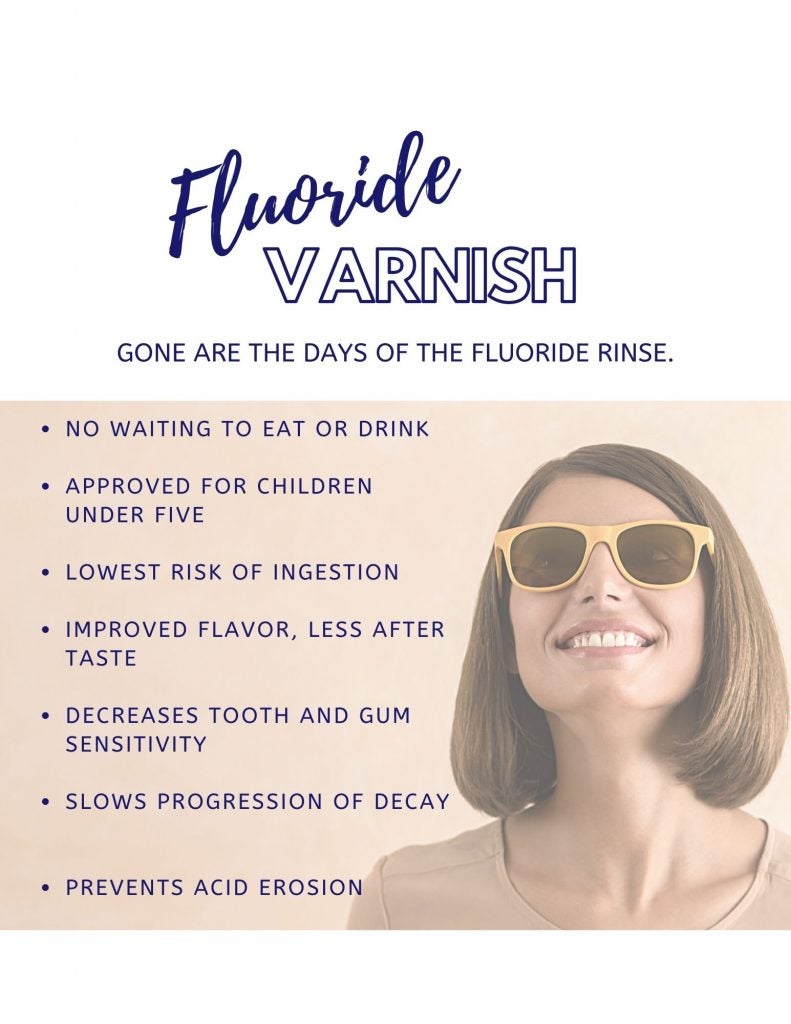-
Inclement Weather
Inclement Weather
In case of an unforeseen weather event, we encourage you to communicate your intentions and/or availability. We understand that road conditions vary greatly by location, and advance notice of your cancelation may mean we can get someone else in, treated, and safely back home before local conditions deteriorate.
If our office decides to close for the day, that decision will be made at 6:00 a.m.. Once that decision is made, we will reach out to our scheduled patients by text message. If you would prefer a different method, please feel free to leave that information on our voicemail at 410-877-3000.
For your convenience, any weather related schedule changes will be posted on our facebook page as soon as those decisions are made.
-
Maryland Healthy Smiles
The Maryland Healthy Smiles Dental Program is broken into 5 enrollment categories. Those categories are Children, Adult*, Pregnant, Postpartum, and Former Foster Care. Each category has it’s own set of policy allowances and limitations, so it is important to understand which category you fall into. Each patient will be enrolled in only one category at a time, regardless of their situation. This means that although you may have been in foster care and are currently pregnant, it is possible that you are only enrolled in the program under “Adult”.
Enrollment Categories/Plans currently accepted:
- Children (under the age of 21)
- Pregnant Women
- Postpartum
- Former Foster Care (Under the age of 25)
*At this time, we are not accepting new patients enrolled in the “Adult” category/plan.
If you have questions about your coverage or your enrollment category, please contact the Maryland Healthy Smiles Program at 1-855-934-9812.
-
Elevating Dental Care: Introducing Fluoride Varnish to Our Standard of Care for Adult Patients
Introduction: At Your Smile Bel Air Family Dentistry, we are committed to providing our adult patients with outstanding dental care that goes beyond expectations. We are excited to announce the formal inclusion of fluoride varnish* as a core component of our standard of care. In this blog post, we will introduce fluoride varnish, highlight its advantages over other fluoride treatments, and emphasize its low risk of ingestion and convenience for our valued adult patients.
Understanding Fluoride Varnish: Fluoride varnish is a highly effective preventive treatment that offers targeted protection against tooth decay and enamel erosion. It is a concentrated gel-like substance that contains a higher concentration of fluoride compared to other fluoride treatments. Here’s why we have chosen to incorporate fluoride varnish into our standard of care for adults:
1. Enhanced Protection: The application of fluoride varnish forms a durable coating on the teeth, acting as a physical barrier against acid attacks and enamel demineralization. This protective layer significantly reduces the risk of tooth decay and helps maintain strong, healthy teeth.
2. Low Risk of Ingestion: We understand the concerns surrounding fluoride ingestion, especially for adult patients. With fluoride varnish, the risk of ingestion is minimal due to its fast-drying nature. The varnish adheres to the teeth quickly, minimizing the chances of swallowing any significant amount.
3. Convenience for Adult Patients: Fluoride varnish offers unparalleled convenience, making it an ideal choice for our adult patients. The application process is simple and non-invasive, taking only a few minutes during your regular dental visit. Unlike other treatments, there’s no need to wait for any specific amount of time before eating or drinking. You can resume your daily activities immediately after the application.The Benefits of Fluoride Varnish for Adults: By including fluoride varnish with our routine dental cleanings, we are prioritizing the oral health and well-being of our adult patients. Here are the key benefits you can expect:
1. Reduced Risk of Tooth Decay: Fluoride varnish provides a concentrated and long-lasting fluoride release that effectively strengthens tooth enamel and helps prevent cavities.
2. Protection against Enamel Erosion: The protective barrier created by fluoride varnish shields the teeth from acid attacks, reducing the risk of enamel erosion and maintaining a healthy smile.
3. Alleviation of Tooth Sensitivity: Fluoride varnish can help alleviate tooth sensitivity by sealing exposed dentin and reducing discomfort.
4. Tailored Treatment for High-Risk Individuals: For adults with a higher risk of tooth decay or specific oral health conditions, fluoride varnish can be applied directly to targeted areas that require additional protection, such as areas showing early signs of decay or exposed root surfaces.Conclusion: With the addition of fluoride varnish to our standard of care, we are excited to offer our adult patients an enhanced level of protection against tooth decay and enamel erosion. Fluoride varnish is a safe, convenient, and highly effective preventive treatment that minimizes the risk of ingestion while delivering targeted benefits. Experience the difference of our comprehensive dental care by scheduling your next appointment today.
*While adult fluoride varnish has been established as a standard of care at our dental office, it is important to note that coverage for this treatment may vary among dental insurance plans. We recommend patients to contact their dental insurance provider for detailed information regarding coverage, benefits, and any associated costs. Please be aware that any fees related to fluoride varnish treatment are the responsibility of the patient. Our team is available to assist you in addressing any queries or concerns you may have regarding insurance coverage.
-
Location Address
We have found that many patients are experiencing issues finding our office using Apple Maps. Please refer to Google Maps.
Follow the smell of crabs and tacos to 1205B Baltimore Pike, Bel Air, Maryland, 21014!
-
Inclement Weather
In case of an unforeseen weather event, we encourage you to communicate your intentions and/or availability. We understand that road conditions vary greatly by location, and advance notice of your cancelation may mean we can get someone else in, treated, and safely back home before local conditions deteriorate.
If our office decides to close for the day, that decision will be made at 6:00 a.m.. Once that decision is made, we will reach out to our scheduled patients by text message. If you would prefer a different method, please feel free to leave that information on our voicemail at 410-877-3000.
For your convenience, any weather related schedule changes will be posted on our facebook page as soon as those decisions are made.
-
Use it or lose it!
As the end of the year is quickly approaching, we want to remind you to utilize any unused insurance benefits before they expire. Many of you also participate in Flexible Spending Accounts or Health Savings Plans with your employer. In most cases, any benefits left in these accounts do not roll over each calendar year.
Your health is important to us and we want to make sure you get the care you deserve. If you or a family member needs an appointment or has any questions, please call us today so we may discuss your needs. We look forward to seeing you at your next visit!
With best wishes for continued good health,
Dr. Danielle ZhuConcerned about out of pocket expenses? We accept the CareCredit credit cards, mobile wallets, and most social mobile payment platforms.
-
Now Open
Our patients have been so gracious and encouraging through this process. We are so thankful to be rounding out our first week here at 1205B Baltimore Pike.
-
We Have Been Keeping a Secret 🤫
We are excited to announce that within a few short days, Your Smile Bel Air Family Dentistry will move to a brand new location, just around the corner in the Bell Gate Shopping Center*. At 1205B Baltimore Pike, you and your family can continue to count on the same personal experience and exceptional care that we have always provided.
Our new office at 1205B Baltimore Pike will be conveniently and safely accessible from Baltimore Pike (also known as Bel Air Road) and Old Joppa Road. Your Smile Bel Air Family Dentistry will share the building with Mucho Gusto and is adjacent to Conrad’s Crabs.
This new space in the Bell Gate Shopping Center was truly built from the ground up, with each element thoughtfully and intentionally designed for the safety and wellness of our staff and patients like you.Starting this new chapter during a global health crisis has provided us the opportunity to create a space that far exceeds the CDC standards for disease prevention. Although most of our upgrades will be fresh and shimmering, some notable additions may not be so obvious. Below, we have highlighted just a few of them.
Upgrade Highlights
• UV Light HVAC Filtration System
• Designated Handicap Parking with Ground Floor Access
• Seamless Hospital Grade Flooring
• Reusable Water Bottle Filling Station
• Scheduled Supplemental Floor Maintenance
• Onsite HOCl Disinfectant Generator
• Closed Circuit Security Monitoring
• (2) Portable HEPA Air Purifiers with Real-time Air Quality Sensors
• Overall Building Design to Reduce Surface Contact.
• Secret Window to Access Free Tacos (Pending Approval)We will open our doors on August 29th exclusively at 1205B Baltimore Pike. Our long-time mascot, Mr. Bear, will be on vacation for the next two weeks as we complete this transition, but the rest of our staff will have daily access to our phones and emails to help you with any questions or concerns. Thank you for your continued support. Without you, we could not have made this possible.
Kindly,
Danielle D. Zhu, D.D.S., P.A.*As a result of ongoing development in the Bell Gate Shopping Center, you may find address inconsistencies between the surrounding businesses. (Interchangeable use of the street names Bel Air Road or Baltimore Pike, and omitted suite identifiers.)
-
Oral Health vs. Covid-19
Bacteria= Bad
Infection= Worse
Covid-19 + Infection= DeadlyThe American Dental Association has linked the progression and severity of Covid-19 to oral health. Turns out, there is – in fact, they found that 20 percent of those who contracted COVID developed severe symptoms due to a high “bacterial load.”
In other words, those who suffer from gingivitis or periodontitis have higher rates of infection causing bacteria in their mouth, which enters their body in a myriad of ways. The first, is through the blood via the vessels in the gums and teeth. The second is via respiratory, by breathing in this bacteria.
As a result, those who may have contracted COVID or are suffering from minor symptoms, develop post-viral bacterial complications, such as pneumonia, sepsis, or respiratory distress syndrome. When this happens, the body’s immune system is weakened, resulting in much more severe symptoms than would have otherwise occurred.
Read this story and more on our Facebook page.
-
Let’s Take Prevention to the Next Level

RECENT POSTS
categories
- Uncategorized
- General Dentistry
- Toothache
- Emergency Dentistry
- Family Dentistry
- Receding Gums
- Cosmetic Dentistry
- Veneers
- Gum Disease
- Gingivitis
- Dental Crowns
- Orthodontics
- Dental Implants
- Root Canal
- Wisdom Teeth
- Teeth Whitening
- Your Smile
- Composite Fillings
- Lumineers
- Dentures
- Invisalign
- BrightSmile
- Dental Bridge
- Abscessed Tooth
- Sealants


